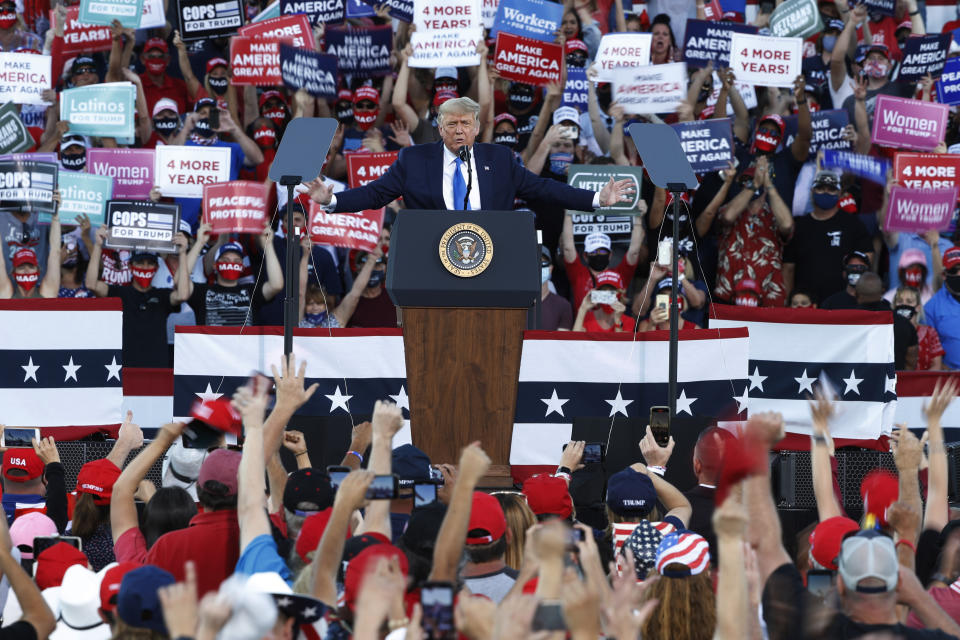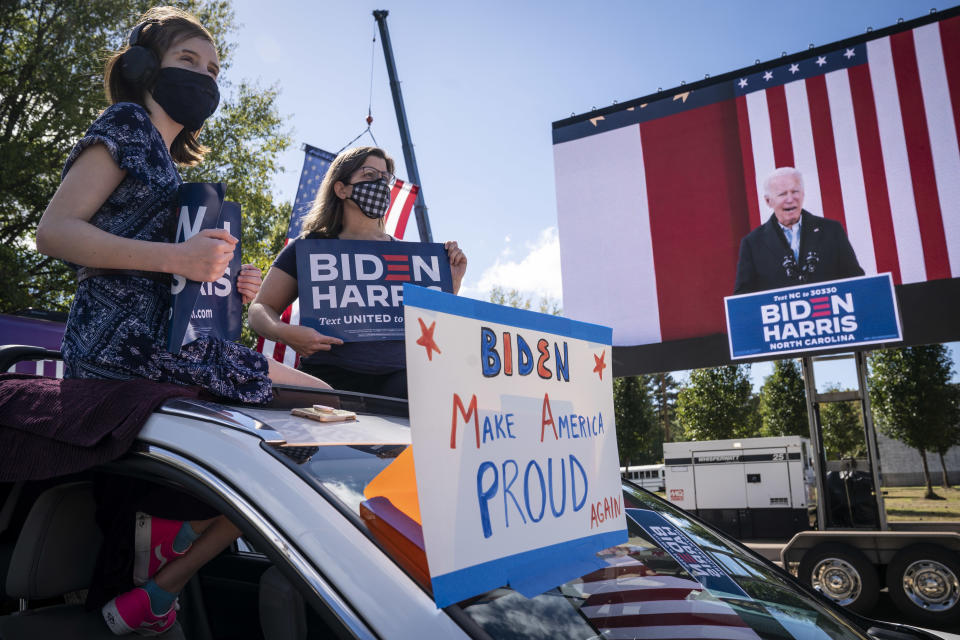Trump's rallies define his view of liberty: The right not to care about other people
In the wake of his recovery from COVID-19, and with his reelection campaign foundering in the polls, President Trump made a fateful decision last week to return to holding mass rallies despite warnings from health officials about doing so during a pandemic.
Thousands of his supporters in Florida, Pennsylvania, Wisconsin, Georgia, Nevada and Arizona have since flocked to regional airports where the mostly outdoor rallies have been held, and cheered as Trump has bounded onto the stage while Lee Greenwood’s “God Bless the U.S.A.” plays.
The chorus to that soaring, cliché-riddled anthem, which has replaced “The Star-Spangled Banner” at Trump events, helps explain why the president has pressed forward with his insistence that America lift coronavirus restrictions: “And I’m proud to be an American, where at least I know I’m free.”
As Trump made clear to his campaign staffers on a Monday call, his notion of freedom means the right to ignore rules meant for the common good.
“People are tired of COVID. I have these huge rallies. People are saying, ‘Whatever. Just leave us alone.’ They’re tired of it. People are tired of hearing Fauci and all these idiots,” he said in reference to the nation’s leading expert on infectious diseases, Dr. Anthony Fauci.
At a mass rally in Nevada over the weekend, Trump, who since his release from Walter Reed medical center has stated his belief that he is “immune” from the disease that has been fatal to nearly 220,000 Americans, summed up the frustration felt not just by his supporters but by all Americans affected by the pandemic.
“Normal life, that’s all we want, we want normal life,” he told the crowd. “We want to be where we were seven months ago.”

But by returning to mass rallies, Trump has gone beyond nostalgia. He is testing a theory propagated by many Republicans that experts are wrong about how easily the coronavirus spreads and whether the more than 8 million American cases of COVID-19 justify modifying our behavior and harming the economy.
“We gotta remember I said it right at the beginning. The cure cannot be worse than the problem itself. Can’t. The cure cannot be worse,” Trump said last Monday at a rally in Florida.
As the president himself noted, his skepticism of the advice by the experts on his coronavirus task force has long been apparent. Trump, after all, returned to holding large campaign rallies in August that disregarded admonitions from experts like Fauci to keep at least 6 feet apart from others and to wear face coverings to prevent spreading the virus.
By the time the president hosted a large White House gathering on Sept. 26 to announce the nomination of Amy Coney Barrett to the Supreme Court, few in his inner circle seemed overly concerned about contracting COVID-19. The same could not be said of Fauci, who watched the Rose Garden party with a sense of horror.
“I was worried that he was going to get sick when I saw him in a completely precarious situation of crowded, no separation between people, and almost nobody wearing a mask,” Fauci said in an interview with “60 Minutes” that aired Sunday. “When I saw that on TV, I said, ‘Oh, my goodness. Nothing good can come outta that, that’s gotta be a problem.’ And then, sure enough, it turned out to be a superspreader event.”
Fauci has been replaced as the public face of the coronavirus task force by Dr. Scott Atlas, a radiologist with no experience in epidemiology. On Saturday, Atlas made news by tweeting his own view about what works to stop COVID-19. “Masks work? NO,” he wrote in a message that Twitter, classifying it as misinformation, removed from the platform — a move cheered by Dr. Deborah Birx, the task force’s response coordinator, who has reportedly confronted Vice President Mike Pence over Atlas’s role.

While most attendees at a Trump rally — or a crowded protest — do not become infected with COVID-19, some do. In Minnesota, for instance, public health officials have traced 23 cases of the disease back to two rallies the president held in the swing state in September.
Citing the health risk of large gatherings, Joe Biden has largely eschewed crowded campaign rallies, instead holding drive-in events where people remain in cars and honk their support. At one such stop on Sunday in Durham, N.C., Biden said Trump was lying to the American people about the pandemic.
“The other night, Trump said in one of his rallies, ‘We’ve turned the corner,’” Biden said. “As my grandfather would say, this guy’s gone around the bend if he thinks we’ve turned the corner. Turn the corner? Things are getting worse. He continues to lie to us about the circumstances.”
Though the attendees at Trump’s rallies are offered face coverings, most — except those selected to stand behind the president’s podium and in front of the television cameras — don’t wear them. When Greenwood’s 1984 anthem begins playing, many in the crowd cheer in celebration of Trump’s imminent arrival and their own freedom to attend the rally without wearing a mask.
Many Biden voters, however, see something different. For them, the spectacle of mass gatherings during a deadly pandemic is both pointless risk taking by the participants and a threat to public health.
In an interview with Military.com, Greenwood said he had written “God Bless the U.S.A.” as a “proper salute to the military and its job” out of a “desire to make the country more cohesive.”
As a paean to liberty, the song naturally lent itself to the campaign of a president who presents himself as a breaker of political norms and traditions. But during the pandemic, which Trump has often described as a “war against an invisible enemy,” the limits of personal freedom have been tested.
As Michael Tomasky wrote Sunday in the New York Times opinion section, the 19th century philosopher John Stuart Mill defined freedom as “doing as we like, subject to such consequences as may follow, without impediment from our fellow creatures, as long as what we do does not harm them even though they should think our conduct foolish, perverse or wrong.”
While voters are unlikely to read “On Liberty” before Nov. 3, how they take Mill’s point, or for that matter Greenwood’s, may well factor into the results of the presidential election.
_____
Read more from Yahoo News:




